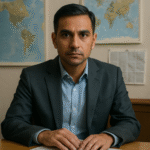New Delhi, September 6: The back-and-forth between Prime Minister Narendra Modi and U.S. President Donald Trump over the past two days has looked, at times, like a squabble and, at times, like a show of camaraderie. Trump snapped one day and praised the next. Modi, for his part, stepped in on Saturday with a steady note that India values the partnership, and yes, he still considers Trump a friend.
Modi’s Balancing Act
Modi’s response was short, put out on X. He said he “deeply appreciates and fully reciprocates” Trump’s remarks and described India–U.S. ties as “forward-looking.” It read like a reassurance meant for multiple audiences. Washington, New Delhi, and anyone watching the relationship wobble after Trump’s outburst earlier in the week.
The Prime Minister didn’t add flourishes or sharp words. Just enough to settle the dust.
Trump’s Two Sides, On Display Again
This wasn’t the first time Trump swung from scolding to smiling. On September 5, he had accused India of leaning toward “darkest China” and complained about tariffs and oil deals. His tone was hard, even dismissive.
Barely a day later, he switched gears completely. He told reporters he would “always be friends with Modi.” He called the relationship “very special.” Then, going further, he said Modi was “a great friend.”
For anyone who’s followed Trump’s style, the whiplash is familiar. He often personalizes foreign policy, talks in absolutes, and then rewrites the script overnight.
Jaishankar Steps In
While Trump was oscillating, External Affairs Minister S. Jaishankar offered something more grounded. Modi, he said, “attaches enormous importance” to the U.S. partnership and has “a very good personal equation” with Trump.
It was classic Jaishankar firm, measured, and almost academic. By stressing both institutional ties and personal warmth, he gave the relationship a frame that wasn’t dependent on Trump’s moods.
Problems Don’t Vanish Overnight
Despite the friendly sound bites, the sticking points remain. Washington has been pressing India over trade barriers and Russian oil purchases. New Delhi has stood its ground, saying its decisions come from strategic autonomy, not pressure.
Both sides know they need each other. The U.S. sees India as a counterweight to China. India looks to America for defense, technology, and a stronger footing in the Indo-Pacific. That’s why, as The Tribune noted, Modi and Jaishankar were quick to underline continuity, not conflict.
Why It Matters
For Modi, the response wasn’t only about Trump. It was about showing India’s foreign policy establishment, business circles, and allies that the relationship is intact. For Trump, the sudden gush of praise carries a domestic undertone the Indian-American vote is increasingly significant as elections loom.
This isn’t the first time the two leaders have walked this line, and it won’t be the last. The friendship narrative plays well in public. The real test lies in whether the upcoming negotiations trade, defense deals, and Indo-Pacific coordination can hold under pressure.
Trump may throw another curveball. Modi, if Saturday’s message is any indication, won’t be swinging wildly in response.
Stay ahead with Hindustan Herald — bringing you trusted news, sharp analysis, and stories that matter across Politics, Business, Technology, Sports, Entertainment, Lifestyle, and more.
Connect with us on Facebook, Instagram, X (Twitter), LinkedIn, YouTube, and join our Telegram community @hindustanherald for real-time updates.
Covers Indian politics, governance, and policy developments with over a decade of experience in political reporting.
Specializes in South Asian geopolitics and global diplomacy, bringing in-depth analysis on international relations.











